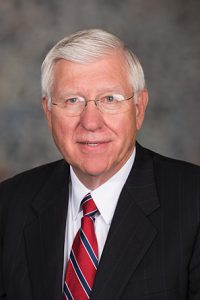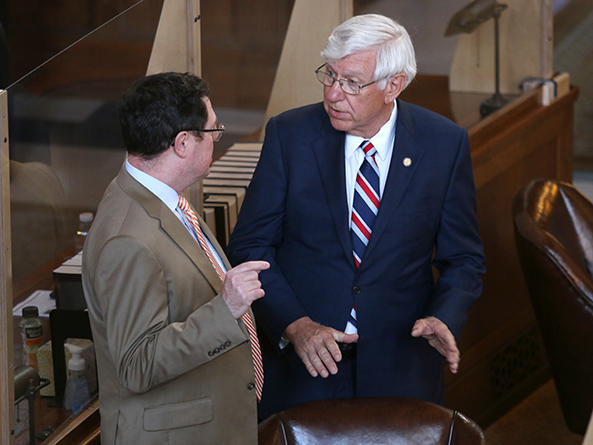DNA collection for felony charges advanced after cloture
Forensic evidence would be collected upon arrest for felony charges under a bill advanced from general file May 7.

LB496, sponsored by Omaha Sen. Robert Hilkemann, would require an adult charged with a felony crime of violence or burglary to provide a DNA sample to law enforcement at the time of booking or to the court during a first appearance.
The state already collects DNA from each individual convicted of a felony crime, Hilkemann said, and uploads those samples to the national forensic DNA database known as the Combined DNA Index System.
“This is a bill that, I believe, will help Nebraska be smart on crime by using DNA to exonerate the innocent and identify individuals responsible for unsolved crimes,” he said.
A Judiciary Committee amendment would replace the bill.
Under the amendment, a DNA sample collected under the provisions of LB496 would not be tested or placed into the state’s database until a judicial determination of probable cause has been made or a hearing to determine probable cause has been waived.
If the charge against an individual is dismissed, the DNA sample would be destroyed immediately and notice would be sent to the individual.
Omaha Sen. Steve Lathrop, chairperson of the committee, said the amendment would align the provisions of LB496 with findings in the U.S Supreme Court decision Maryland v. King. The committee amendment is necessary, he said, to prevent the bill from violating Fourth Amendment protections against unlawful search and seizure.
Norfolk Sen. Michael Flood called the bill the natural next step in forensic data collection.
“This is the new fingerprint,” Flood said. “It’s going to solve crimes and it’s going to hold people accountable.”
Sen. Patty Pansing Brooks of Lincoln offered an amendment, adopted 32-0, to clarify that the provisions of LB496 would not apply to juveniles.
Pansing Brooks said she opposed the bill because it is a “perversion” of the ideal that an individual is innocent until proven guilty.
“Even if a person is arrested or charged with a crime, they are still entitled to due process,” she said. “Gathering this DNA because a prosecutor has decided to charge somebody with something … our system does not work that way.”
Also speaking in opposition to the bill was Omaha Sen. John Cavanaugh. For every story of a cold case solved by DNA, he said, countless other innocent people would be caught up in the system.
“We are going to undermine people’s individual rights to privacy by letting the ends justify the means,” Cavanaugh said.
Bellevue Sen. Carol Blood expressed concern that crime labs already inundated with hundreds of untested rape kits would be unable to process the number of new DNA samples created by LB496.
“How are we expecting these labs to manage the increased influx of samples from a new source of DNA — pre-conviction DNA that we think violates the Fourth Amendment — how are they going to handle this extra workload when they can’t handle what they have now?” she said.
Omaha Sen. Justin Wayne offered an amendment to incorporate provisions of his LB28, which would allow an individual to file a motion for a new trial when new evidence or testimony becomes available from a witness who previously refused to testify or provide evidence due to a constitutional privilege.
Wayne cited the case of Earnest Jackson, an Omaha man currently incarcerated for a crime for which another person admitted guilt after Jackson was sentenced.
“We understand that sometimes our justice system gets it wrong and we, as a state and [as] lawmakers, have a chance to get it right,” he said. “Today, we have a chance to get it right.”
Omaha Sen. Terrell McKinney said he worried that the provisions outlined in LB496 would be abused by law enforcement, but that he potentially could support the bill if the Wayne amendment were adopted.
“If there is something that a judge could see that could free an individual, that judge should be able to see that information,” he said.
Sen. Suzanne Geist of Lincoln expressed concern about the Wayne amendment. She said the provisions could incentivize individuals to commit perjury in order to help a codefendant at trial.
The Wayne amendment failed on a 24-9 vote. Twenty-five votes were needed.
Wayne then filed and later withdrew a motion to bracket LB496 until May 28, which effectively would end debate on the measure for this session.
He said that under the bill, a DNA sample would be destroyed only when a charge is dismissed or a person is acquitted — not if the individual accepts a plea. In that circumstance, he said, the original charge is amended, not dismissed.
“The problem is that 90 percent of the cases in the court system plead and they plead to a different charge or a lower charge,” Wayne said. “Even if you plead, you’re stuck with your DNA being housed forever.”
Sen. John Cavanaugh of Omaha offered an amendment, adopted 31-0, which incorporated provisions of his LB316. These would clarify the date from which the one-year limitation for filing a motion for post-conviction relief would run and require the prisoner to file notice with the district court.
Omaha Sen. Megan Hunt offered a series of amendments in an effort to extend debate on LB496, which she said would encourage government overreach into the lives of innocent people. Hunt said Nebraska already has a process in place for innocent people who are wrongfully accused of a crime to seek out DNA collection.
“Proponents say that things like LB496 will exonerate innocent people, but this is not an exoneration bill and it has nothing to do with innocence,” she said.
After approximately eight hours of discussion, Hilkemann offered a motion to invoke cloture, which ends debate and forces a vote on the bill and any pending amendments. Lawmakers voted 33-8 to invoke cloture. Thirty-three votes were needed.
Following the successful cloture motion, senators voted 38-3 to adopt the pending Judiciary Committee amendment. Lawmakers then voted 30-11 to advance LB496 to select file.


